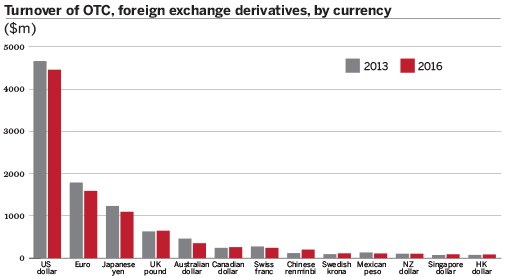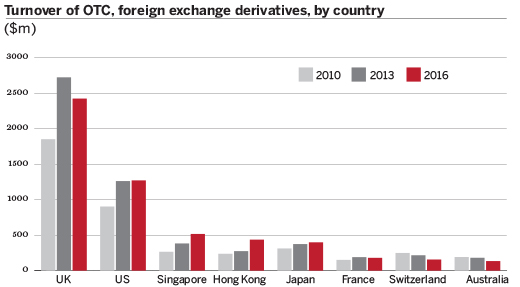The latest global foreign exchange survey reveals the rise of Asia’s trading centres and the knock-on effects of China opening up. Danielle Myles analyses the findings.
The foreign exchange (FX) market has become more global and has weathered the benchmark-fixing scandal, according to the Bank of International Settlements’ (BIS) three-yearly FX report released in September. Asian currencies and trading centres have climbed the rankings, but the renminbi has not performed as strongly as many expected.
Based on trading throughout April of the relevant year, the survey shows that daily turnover in 2016 averages $5088bn, down from $5345bn in 2013. But following the $8bn in FX-related fines being paid over the past 24 months and April 2013’s unusually high Japanese yen trading (which made the previous results abnormally high), the market has shrunk less than some had feared.
“The most important theme is the market is continuing, albeit at a slower pace than in the past,” says David Puth, CEO of currency settlement system CLS. “Given some of the challenges the market has faced since the last survey, there was an expectation that volumes would decline from those reported in the 2013 survey.”
Tougher regulation and balance sheet considerations go some way in explaining the 4.8% drop; banks cannot provide liquidity like they used to, which has led them to change their FX strategy. “The big London powerhouses were really chasing FX volume a few years ago, and I think that’s why BIS’s figures have risen so significantly over the previous surveys,” says Scott Worton, head of FX trading for Europe, the Middle East and Africa at BNY Mellon. “But the higher cost of doing a trade today means that chasing volume with very little revenue doesn’t make sense any more.”
Winners and losers
London is still the dominant FX centre, but its market share has dropped from 41.78% to 37.06%. The beneficiaries have been Singapore (whose share rose from 5.73% to 7.9%) and Hong Kong (4.11% to 6.68%). Factor in Tokyo (which rose from 5.6% to 7%), and it is clear that Asia’s financial centres are strengthening as FX trading hubs. “It’s a positive step, but not altogether surprising. Both Singapore and Hong Kong have made real investments to attract new participants,” says Mr Puth, who adds that this will help with the further globalisation of markets around the world.
Unsurprisingly, the fastest climbing currency is the renminbi. BIS data shows it is now the eighth most traded currency in the world. But some in the industry are underwhelmed by its 68.3% turnover increase since 2013. Other market measures suggest it should have been much higher. “In Commerzbank across all channels, [offshore renminbi] alone is now the fifth most traded currency, just below sterling and the Australian dollar. So it has climbed and we are not even including the onshore volumes,” says Bernard Yeung, head of emerging market FX and rates at Commerzbank. Data from electronic FX platform EBS also suggests the renminbi is taking a larger market share. Mr Worton of BNY Mellon expects the renminbi to be among the top five currencies in the next BIS survey.
Trading increased in other Asian currencies, including the South Korean won (up by 31.25%), the Singapore dollar (21.33%) and the Hong Kong dollar (14.29%). Their progress has been aided by reforms coming out of Beijing. “Now that China has opened more of its markets, you see it tapping into different countries to establish cross-border transactions directly into [onshore or offshore renminbi], bypassing dollars and the euro,” says Mr Yeung. “So you could well see much more activity in peripheral currencies, which should benefit Hong Kong and Singapore as trading centres, given their proximity to China.”




